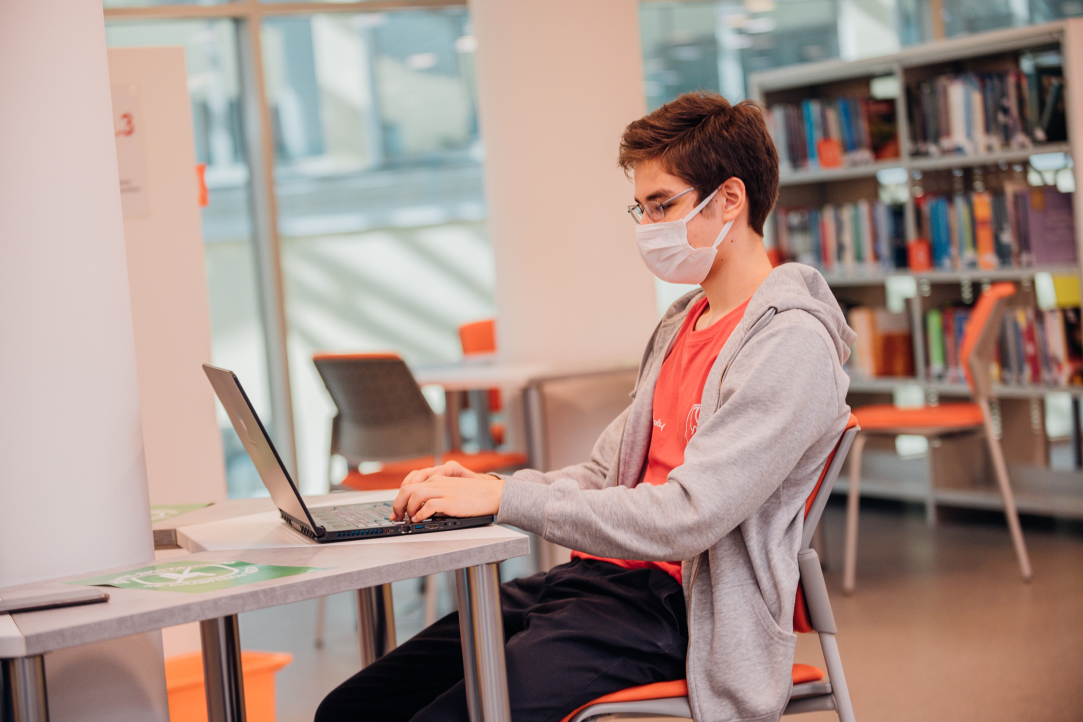Online Education: The ‘New Normal’ and Its Pitfalls

On the first day of the XI International Russian Higher Education Conference (RHEC), which was held online, representatives of universities and colleges discussed the impact of the coronavirus pandemic on Russia’s education system.
In his opening remarks for the event, Isak Froumin, Head of the HSE Institute of Education, noted that the techno-optimism of some education managers and employees, who predicted a successful transition to online instruction, proved to be excessive. Many teachers lacked the skills to digitize their courses, and the promised convenience of the new format was not as clear. Some universities did not even have paid Zoom memberships, so some teachers reduced their class time to meet the service’s free, non-member session time limit.
The transition to distance learning exacerbated educational inequality: 10% of students did not have the necessary equipment, and among students from low-income families, this share reached 30%. To mitigate this problem, universities lent computer equipment currently not in use in computer classes to students.
Distance learning has also confirmed the need for direct interaction between students and teachers and within student groups. At the same time, the pandemic gave universities a renewed sense of social responsibility, reminding them of issues related to student well-being in the broadest sense.
Now higher education is in a period of turbulence and it is nearly impossible to make long-term forecasts about its future due to the dramatically changing situation, said Isak Froumin.
HSE Vice Rector Maria Yudkevich noted that over the past months, there have been many publications about the impact of the pandemic on different aspects of life. She highlighted studies that have focused on problems of the ‘new normal’: when the level of uncertainty reached new heights, many researchers realized that what was happening was permanent, not temporary.
The pandemic, she said, made it difficult for researchers: many stopped collecting data, and it became difficult to conduct experiments and work in laboratories. This caused a significant shift between research, education, and service activities. Teaching, which previously occupied a limited place in their work, has now come to the fore. While teachers work less with students, the share of time they spend on preparing lectures and grading assignments, as well as communicating with students, has increased significantly.
At the same time, the transition to online education presents new challenges and new opportunities. Research centres previously of lesser prominence are now reaching new levels of visibility thanks to the launch of new communications, online seminars, and conferences.
Now, Vice Rector Yudkevich suggested, it is important to understand what lessons we can learn from the current situation, how the academic labour market should react to them, and how universities should move from survival to development in their research.
Online Master's Programmes: Opportunities and Pitfalls
Sessions began with the round table, ‘Russian Master's Degree Programmes and Pandemic Challenges’. At the round table, Natalya Shulgina, Director of the Potanin Foundation Fellowship Programme, noted that with the onset of the pandemic, the Foundation extended deadlines for approved projects and project reports, and they continued to fund research for master's degrees and programmes related mainly to digital topics.
Natalya Andreichenko, Project Office Director of Southern Federal University, noted that the timely mastery of online education technology gave an advantage to universities that had made efforts to develop it in advance. She noted that three years ago, SFedU began tailoring master's programmes to target groups and foreign students by focusing on digital and online tools. 141 programmes were organized, including 12 in foreign languages. These efforts have led to an increase of students in departments that charge full tuition, including those from other universities.
As a result, students were prepared to switch to remote learning, and online operations made it possible for SFedU to expand the geographical diversity of its incoming class. Even without a pandemic, this should become a driver for ensuring the quality of future admissions, but it also depends on the digital proficiency of university staff and the quality of proctoring.
Evgeniya Opfer, Research Fellow at the HSE Institute of Education, drew attention to the pitfalls of online education at the Master’s level. Russian universities have the right to create online Master’s programmes in accordance with Russian education law and the Federal State Educational Standard, but the regulatory documents provide more of a framework rather than specific instructions.

In these new conditions, it is difficult for teachers to take into account their teaching load: it is not clear how to count one lecture delivered in different groups or how to count online consultations, which sometimes have to be conducted 24/7, etc.
Another problem is what to do about compensation for Internet traffic and additional equipment when classes are held remotely. A separate pitfall, according to Evgenia Opfer, is the accreditation of online programmes, which follows the same procedure as that for regular programmes.
Andrei Dementiev, Director of Teaching Excellence Development at the HSE Institute of Education, drew attention to the need for a better understanding of course rescheduling, taking into account the possibilities of digital and online technologies, including learning outcomes and assessment tools that teachers use in daily practice.
Experience from recent months, Dementiev suggested, allows one to draw several cautious conclusions. In particular, the transition to online instruction allowed some teachers to switch to new technologies and teaching paradigms. Education and active use of new technologies expands the boundaries of the university far beyond the region. At the same time, the English-language interface and the time it took to learn how to use it did not present any obstacles to mastering new communications and creating new tools.
New technologies make it possible to track digital traces, which means that online master’s programmes can develop further, said Andrei Dementiev.
Daria Shcheglova, a research fellow at the HSE Institute of Education, believes that many master's programmes were not equipped with sufficient digital competencies, especially pedagogical and educational programmes. Undergraduate students want to gain skills that go beyond simple technical skills. They don’t want to merely click on things; they want to be the architects of their own activities, and this especially goes for students of the humanities and education, she said.
Daria Khlebovich from Irkutsk National Research Technical University spoke about working with foreign students forced to stay at home due to the pandemic. At the Baikal Institute of BRICS, which is developing its master’s programmes, international students, mainly from China, make up 9.8% of the student body, and most of the students study in English-language programmes. 70% of international students were unable to enter Russia. Classes were transferred mainly to a synchronous format, and it was necessary to quickly implement and master new platforms in addition to allocating classrooms to instructors for their work.
So as not to disrupt programme operations during the transition, they looked to the experience of global companies (presented on the programme website) as models.
Undergraduate students were gathered at one of the University’s Chinese partner universities, which allowed the students to continue their studies and the quality of education to be preserved. In addition, tutors worked in China to help students connect with teachers and deal with organizational issues.
Anna Garmonova, Director of the HSE Centre for Regional University Partnerships, noted that the online admissions process allowed regional universities in Russia to expand their master’s programme admissions, and it confirmed that international students can study at Russian universities during the pandemic. She predicts an increase in the number of online Master’s degrees, which, in her opinion, will require a stronger focus on accreditation and programme quality.
Not Just Higher Education: Colleges Compete with Universities
The round table ‘Regional Analytics and Educational Policy of Higher Education’ opened with a presentation by Niyaz Gabdrakhmanov, a research fellow at the HSE Institute of Education. He spoke about a study, ‘Education during Coronavirus’, in which he and researchers studied groups of 309 universities from 80 regions, 2.7 million posts, 1.12 million accounts, 1000 informal communities that reflect student sentiment.
Niyaz Gabdrakhmanov drew attention to the fact that most students expressed loyalty to their institutions in light of the online transition. At the same time, community analysis reveals a number of problems in the daily activities of universities, including excessive bureaucratization and difficulties in the transition to online education. He also suggested that in the future, the number of students and applicants who are able to pay full tuition and study at a university in a different region may decrease due to the economic difficulties that families are experiencing.
Ivan Gruzdev, an analyst at the Centre of Sociology of Higher Education at the HSE Institute of Education, said that according to the results of an express survey of 3,000 high school graduates, the demand for higher education among them remains high. 85% plan to go to university after high school, 5% intend to after college, and 72% believe that higher education is necessary and important. 64% of high school students apply to university knowing what area they will specialize in and where they want to study.
RANEPA Professor Tatyana Klyachko noted that usually 85% of high school graduates attend university, but when researchers asked if higher education is necessary for success, only 50% of senior students answered yes (though earlier the share was as high as 80%). Students make their main choice, she believes, in 9th grade and not 11th. Currently, in some regions 70% of 9th grade graduates go on to educational institutions of secondary vocational education, although 89% of parents consider a higher education necessary. We will see which of these trends wins in a few years, she says.
Sergei Chernyshov, Director of Novosibirsk City Open College, said that the admissions rates to colleges in Novosibirsk and neighboring regions exceeds those of Bachelor’s degree programmes, and if universities begin admissions for open source programs, they will dramatically increase enrollment. ‘We want to build our college in the model of a university, and we are working with the HSE University campus in Perm,’ said Sergei Chernyshov.
Mr. Chernyshov noted that, already this year, a quarter of students entered the open college from other regions and even countries, and the proportion of those who entered after completing the 11th grade has doubled compared to last year — up to 40%. He lamented that the local Ministry of Education still believes that the labour market needs teachers and machine builders, although in the region there is a predominant demand for IT and logistics specialists. In addition, he suggested, the pandemic has shown that it is not infrastructure (buildings and equipment) that is important for attracting college students, but people, services, and a clear online application system.
Irina Abankina, a professor at the HSE Institute of Education, noted a twofold increase over the past five years in admissions to departments that charge tuition. This reflects the desire of young people to build their own lives and become independent from their parents, as well as a decrease in fear of serving in the army. Perhaps, she suggested, we will soon see changes in families’ educational strategies.

